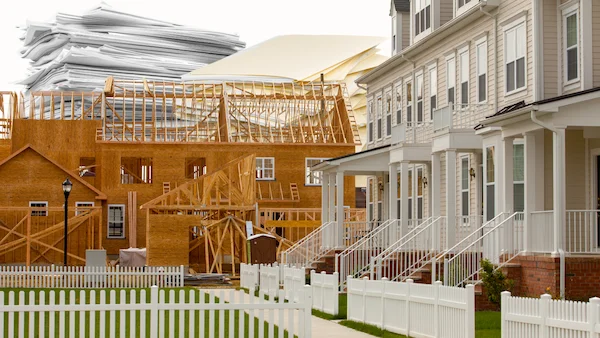A couple of weeks ago, Chuck wrote a column critiquing the book “Abundance” by Derek Thompson and Ezra Klein. This got some backlash on Reddit, and Chuck ended up doing a Q&A in the comments. There were some good questions that came up a few times, so we’ve consolidated Chuck’s answers to them here.
Don’t the “Abundance” and Strong Towns Approaches Complement Each Other?
There’s a lot of overlap between what Strong Towns is pushing for and what “Abundance” is calling for, especially in terms of undoing regulatory stasis and enabling small, incremental change.
We agree: the government needs to “get stuff done.” But, if all — or even most — of the doing happens at a distance, without community buy-in, it will not stick. It needs to be accompanied by bottom-up capacity and cultural alignment. Otherwise, we risk building a fragile system where every win depends on who controls the lever, not whether the community can actually sustain what’s been put in place.
“Abundance” explicitly presents itself as a political strategy, a way for Democrats to win elections by demonstrating visible, material success in the places they govern. That framing naturally centers action around levers of power and policy that are available to centralized institutions. So even if the authors don’t say, “this is the only way,” the implicit message is that centralized action is the main lever that matters.
I don’t see that as inherently hostile to bottom-up change, but I do worry that the grassroots, cultural, and incremental work we focus on at Strong Towns often gets treated as secondary or optional in this worldview. To me, these strategies are not just complementary; they are foundational.
So yes, let’s aim for complementarity. But let’s also be honest about what each approach assumes about where power comes from and how change is sustained. And let’s be clear about the values we’re prioritizing. For Strong Towns, that means embracing messiness, working at human scale, and always keeping the long game in mind. If we can hold that while still pushing to get things done, we’re on the right path.
Isn’t State Reform Necessary When Places Refuse To Change?
I get why people are frustrated with local governments and neighbors that block needed housing. But our current system and zoning codes weren’t simply handed down by those groups. They were — and still are — tools of the professional class: planners, engineers, and consultants responding to federal incentives, state mandates, and legal doctrines that encouraged uniformity, separation, and growth as efficiency. Local politics played a role, yes, but the system we have was built top-down, with heavy influence from distant institutions shaping what cities were “allowed” or had the incentive to do.
Now, ironically, some are advocating that we use that same top-down muscle — preemption, override, uniformity — to fix the mess. I get the impulse. But we also need to repair the civic fabric that zoning distorted by helping people rediscover their agency, rebuild trust, and embrace change where they live. That’s how you get real change in the culture and capacity that makes reform durable and effective. If we don’t do that, we’re just flipping the polarity on the same broken system.
I'll cite an example from here in Minnesota. State laws require cities to accommodate recovery homes in the city — you are not allowed to out-zone these facilities — so most cities put them in the industrial park where recovering alcoholics, who generally are not allowed to drive, can't access any services. Instead of a bottom-up appeal to our humanity, we had a top-down bureaucratic response to manage. Box checked, nobody really helped.
How To Change a City’s Culture
Changing a place’s culture to one that embraces change and builds resilience takes time, trust, and persistence.
We approach this by talking about change in terms that benefit people who would otherwise resist it. We show them how they, and others they know, could benefit directly from adding more housing to their neighborhoods. We also acknowledge their reasonable concerns.
To do this, you first have to recognize people’s concerns. Some suggest that homeowners resist housing development because scarcity benefits them economically. While this is true in a very macro sense — if we make housing scarce, then people who own housing will see that asset go up in value — I question whether people think in these terms.
What I observe is people showing up to oppose change in their own neighborhood. Sometimes people define "neighborhood" more broadly than others, but they’re still concerned that the place they live and have vested in will become unrecognizable. I observe that people are very distrustful of planners and local government, distrustful of developers, have seen changes happen in their community or in others that they don't want near them, and are hyper-sensitive to changes that might put them on what feels like a one-way path to decline and exploitation.
Once we recognize that the economic problem is an affirming side effect of the real motivation — fear of cataclysmic change — then we can have conversations that shift the apprehension and mistrust. I'm not trying to say that is easy or simple to do, but it is a different approach than if we're stuck on the economic factors.
Why Do You Encourage Statewide Reform for Parking but Not Housing?
This question refers to last year, when I joined a press conference at the Minnesota State Capitol in support of a bipartisan bill to prohibit cities from adopting parking minimums. I struggle with this a lot — and still struggle with my decision to support the bill. I was definitely in uncomfortable space and still have misgivings.
That being said, parking reform is very simple, certainly the simplest thing that we advocate for. And the answer is universal — big cities, small towns, and everything in between should get rid of their parking minimums. They are clearly made up, harmful, irrational, and destructive. There is no instance where there is nuance on that policy change.
In contrast, housing is wickedly complex, almost by definition. There is so much nuance and complexity when it comes to housing that a one-size-fits-all set of reforms is deeply problematic to me.
The Strong Towns project starts with a recognition that cities are complex, adaptive systems. In general, you'll see me supporting things that give cities more tools for adaptation — along with more responsibility to solve problems — and being adverse to things that remove flexibility. That’s why I’m cautious about blanket state preemption. It can solve real problems in some places while creating unintended ones in others.
ADU reform comes the closest to parking minimums in terms of simplicity, and I can see places where I could get behind a statewide effort. Single-family exclusive zoning reform is another I've not really balked at. But what I've witnessed with “Abundance” is a momentum around this simple lever of power — like an easy button we can press over and over — and that is exactly the muscle I didn't want us to get used to with parking reform.
There is nothing stopping any city from doing the type of zoning reform we need to see happen. I want to build the agency — build those civic muscles — so those rules are not only changed, but the changes result in a city culture that embraces adding more units, thickening up neighborhoods, and building stronger places. That way, the rules communities adopt can evolve over time, responding to what’s working, what isn’t, and what’s changing on the ground.
Final Thoughts From Chuck
Recently on Twitter, I shared the following: "Abundance asks us to empower others to fix what we already have the power to change. At Strong Towns, we think you don’t need to wait for permission."
That is about as good of summation as I can write. A commitment to bottom-up is not a fetish or obsession with local. It is a recognition of how systems grow strong and resilient, how we build agency and empowerment. Part of our mission statement is to "work to elevate local government to be the highest level of collaboration for people working together in a place, not merely the lowest level in a hierarchy of governments."
That is difficult — yes — seemingly way harder than getting your favorite statewide or national candidate elected and then urging them to institute a centrally-directed reform, but we have never promised easy. What we have always sought is people who are ready to own their block, their neighborhood, their community and then join with other similar-minded people on a journey of transformation. What we have promised them is that we will use our content platform to make that journey easier — to make the change they are pushing for inevitable — by sharing their story, cheering them on, and making the case for what they are doing.
Abundance thinking is very seductive because it suggests that there is a way to empower others to work on your behalf, that this is the path to power. Some on this thread have suggested we don't understand politics and power, both of which are very much not true. We understand power only too well and recognize, especially in 2025, how the thing you thought you accomplished last year is now the foil in this year's culture war. We want as little to do with that paradigm as possible.
I just got back from Providence where we had our National Gathering. I told the hundreds of Strong Towns advocates present about our theory of power leading to change. Ours is not a power like gravity, where we grow bigger and bigger until we can warp and change the fabric around us. Our is power like compound interest, where small victories today compound over time to the point where they change culture and become inevitable.




.webp)
.webp)